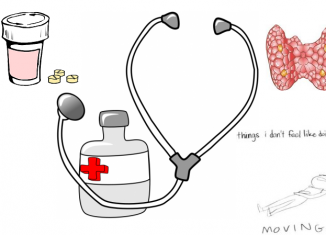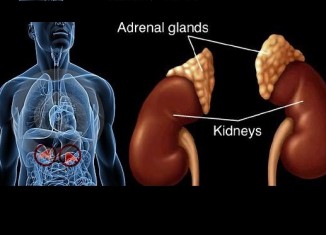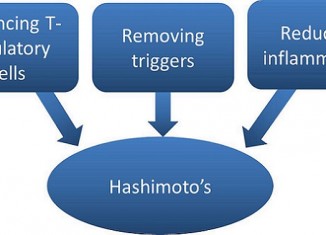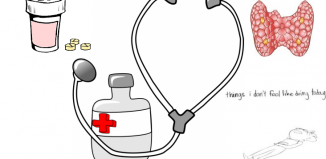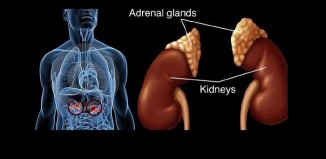Hashimoto’s disease (chronic lymphocytic thyroiditis, autoimmune thyroiditis) is a form of chronic inflammation of the thyroid gland (fig 1). The thyroid gland (in Dutch schildklier), located in front of neck, is part of the endocrine system (fig 3), which produces hormones that coordinate multiple body functions.
The thyroid gland makes two thyroid hormones, triiodothyronine (T3) and thyroxine (T4). A nice video’s explaining the thyroid hormones production (video 1) and common thyroid problems (video 2).
Two brain structures (the pituitary gland (fig 2) and the hypothalamus) regulate the thyroid hormones as follows (video 3):
- The hypothalamus prompts the pituitary gland to make a thyroid-stimulating hormone (TSH).
- The pituitary gland checks the amount of T4 and T3 in the blood and releases TSH. If the T4 and T3 levels need to be increased.
- The thyroid gland secretes the needed T4 and T3. The more TSH the thyroid receives, the more T4 and T3 it secretes.
- The pituitary gland may stimulate the thyroid gland to make T4 and T3 but, in the case of Hashimoto’s disease, the thyroid gland can’t deliver them.
- The immune system creates antibodies that attack thyroid tissue. The thyroid gland becomes inflamed and thyroid cells become permanently damaged (can’t make T4 nor T3).
- In response, the pituitary gland secretes more thyroid-secreting hormone (TSH).
- Then the thyroid may enlarge (goitre).
Hashimoto’s disease is an autoimmune disorder, meaning the body’s immune system attacks its own healthy tissues. The immune system makes antibodies that attack cells in the thyroid and restrict the ability to produce thyroid hormones. Large numbers of white blood cells called lymphocytes accumulate in the thyroid. Lymphocytes make the antibodies that initiate the autoimmune process. Over time, thyroid damage can cause thyroid hormone levels to be too low. This is called an underactive thyroid or hypothyroidism. An underactive thyroid causes every function of the body to slow down, such as heart rate, brain function, and the rate your body turns food into energy.
Consequences of having Hashimoto’s
- abnormal calcium metabolism
- chronic constipation (risk of infection)
- reduced efficiency of the liver and gall bladder (also kidney)
- reduced production of growth hormone
- reduced metabolism and weight gain
- glucose metabolism disorder (slowly enters the cells having symptoms such as “brain fog” and causing hypoglycemia)
- elevated levels of cholesterol and triglycerides
- problems with correct functioning of the brain (mood swings, depression)
- abnormal metabolism of estrogen (this may lead to breast cancer, ovarian cysts)
- disturbed metabolism of adrenal hormones
- deficiency of progesterone and stopping ovulation
- anemia
- increased levels of homocysteine and heart disease risk
- reduced body detox (thyroid hormones affect the phase II of the detox in the liver)
- reduced production of hydrochloric acid and impaired metabolism of proteins

